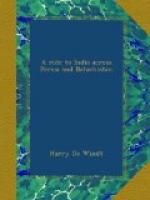It is only fair, however, to say that the road we were now travelling is not the regular post-road, which lies some distance to the eastward of Rabat Kerim, but was now impassable on account of the snow. The smaller track joins the main road at Koom. By taking the less frequented track, we were unable to go through the “Malak al Niote,” or “Valley of the Angel of Death,” which lies about half-way between the capital and Koom. The valley is so called from its desolate and sterile appearance, though, if this be so, the greater part of Persia might with reason bear the same name. Be this as it may, the Shagirds and natives have the greatest objection to passing through it after dark. A legend avers that it is haunted by monsters having the bodies of men and heads of beasts and birds. Surrounded by these apparitions, who lick his face and hands till he is unconscious, the traveller is carried away—where, history does not state—never to return.
If the first day’s work had been hard, it was child’s play compared to the second. The track, leading over a vast plain, had recently been traversed by a number of camel caravans, which had transformed it into a kind of Jacob’s ladder formed by holes a couple of feet deep in the snow. As long as the horses trod into them all went well, but a few inches to the right or left generally brought them blundering on to their noses. The reader may imagine what a day of this work means. The strain on mind and muscle was almost unbearable, to say nothing of the blinding glare. Yet one could not but admire, during our brief pauses for rest, the picture before us. The boundless expanse of sapphire blue and dazzling white, with not a speck to mar it, save where, occasionally, the warm sun-rays had, here and there, laid bare chains of dark rocks, giving them the appearance of islands in this ocean of snow.
At Pitche, the midday station, no horses were to be had; so, notwithstanding that deep snow-drifts lay between us and Kushku Baira, the halt for the night, we were compelled, after a couple of hours’ rest, to set out on the ponies that had brought us from Rabat Kerim. More perhaps by good luck than anything else, we reached the latter towards 9 p.m. A bright starlit night favoured us, and, with the exception of a couple of falls apiece, we were none the worse. We found, too, to our great delight, a blazing fire burning in the post-house, kindled by some caravan-men. But there is always a saving clause in Persia. No water was to be had for love or money till the morning, and, knowing the raging thirst produced by melted snow, we had to forget our thirst till next day.
[Illustration: POST-HOUSE AT KUSHKU BAIRA]
A pleasant surprise also was in store for us. Two or three miles beyond Kushku Baira we were clear of snow altogether. Not a vestige of white was visible upon the bare stony plain. Nothing but dull drab desert, stretching away on every side to a horizon of snow-capt hills, recalling, by their very whiteness, the miseries of the past two days. “Berik Allah!” [B] cried Gerome. “We have done with the snow now.” “Inshallah!” [C] I replied, though with an inward conviction that we should see it again further on, and suffer accordingly.




